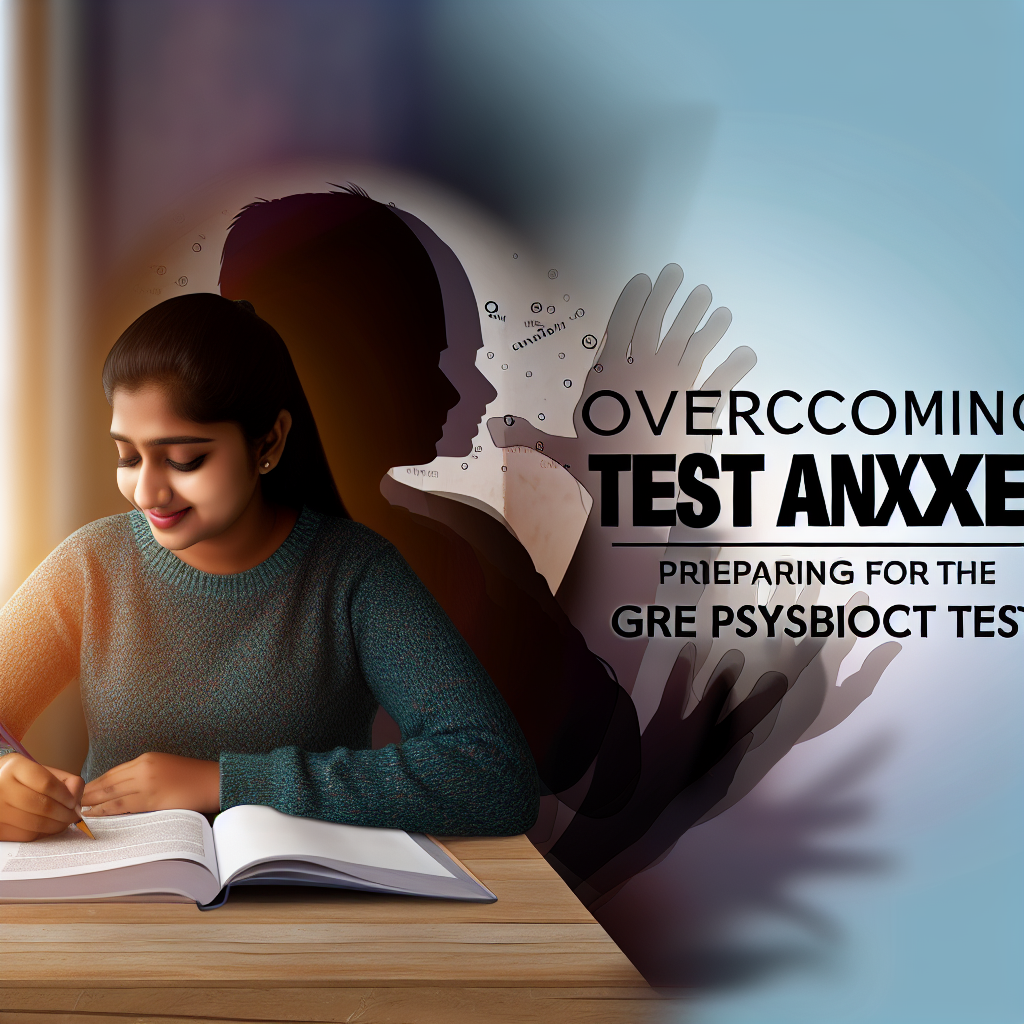
Overcoming Test Anxiety: Preparing for the GRE Psychology Subject Test with Proven Strategies
Introduction
Have you ever found yourself staring blankly at a textbook, heart racing, palms sweating, overwhelmed by the fear of failure? If you have, you’re not alone. Test anxiety is a common experience that can hinder your ability to perform at your best, especially when tackling something as significant as the GRE Psychology Subject Test. In this article, we will explore the multifaceted approach to overcoming this anxiety, providing you with actionable insights and strategies to enhance your performance. Overcoming Test Anxiety: Preparing for the GRE Psychology Subject Test isn’t just about studying hard; it’s about building a resilient mindset that allows you to thrive even under pressure.
The Nature of Test Anxiety
Understanding Test Anxiety
Test anxiety is a psychological phenomenon that can significantly impair your performance on exams, leading to feelings of dread, unease, and self-doubt. It can manifest in various physical symptoms, including nausea, sweating, and rapid heartbeat. But why does this happen? Understanding the roots of test anxiety can help pave the way for effective overcoming strategies.
Case Study: Sarah’s Journey to Conquer Test Anxiety
Take the case of Sarah, a graduate student who struggled with severe test anxiety. Despite being well-prepared for her GRE Psychology Subject Test, she often found herself paralyzed by fear on exam day. Seeking help, Sarah began attending workshops on test preparation and anxiety management. Through therapy and strategic study techniques, she learned how to manage her anxiety, ultimately achieving a score that allowed her to secure a place in her desired program. Sarah’s story highlights that understanding and addressing test anxiety can transform your performance.
Preparing Academically
Creating a Study Schedule
One of the most effective ways of overcoming test anxiety is to create a structured study plan. A well-designed schedule not only ensures comprehensive preparation but also reduces feelings of chaos and uncertainty. Here are some key steps:
Assess Your Baseline Knowledge: Take a practice test to identify strengths and weaknesses.
Break Down the Content: Divide the GRE Psychology Subject Test syllabus into manageable sections.
Allocate Time Wisely: Dedicate specific hours weekly to each subject area, ensuring balanced preparation.
- Regular Reviews: Include weekly reviews to reinforce learning and build confidence.
Table: Sample Study Schedule
| Week | Topic | Time Allocated | Activities |
|---|---|---|---|
| 1 | Biological Basis | 5 hours | Read, flashcards, quizzes |
| 2 | Cognitive Psychology | 5 hours | Practice problems, group study |
| 3 | Social Psychology | 5 hours | Case studies, peer discussions |
| 4 | Review Sessions | 3 hours | Mock tests, previous questions |
| 5 | Full Review | 10 hours | Intensive study, focus on weaknesses |
Note: Adapt the schedule according to your personal pace and comfort level.
Case Study Analysis: Jake’s Structured Preparation
Jake, another student preparing for the GRE Psychology Subject Test, crafted a meticulous study schedule that included not just content review but also mindfulness exercises. He found that setting specific, measurable goals for each study session not only bolstered his confidence but also reduced his anxiety. This structured approach allowed him to enter the exam room feeling prepared rather than panicked.
Building a Positive Mindset
Cognitive Behavioral Techniques
Adopting cognitive behavioral techniques can significantly alter your mindset around testing. Challenge negative thoughts by reframing them into positive affirmations. For example:
- Negative Thought: “I will fail this exam.”
- Positive Reframe: “I am prepared, and I will do my best.”
Mindfulness Practice
Incorporating mindfulness practices into your study routine can greatly contribute to overcoming test anxiety. Mindfulness meditation, deep-breathing exercises, or even short walks can help center your thoughts and calm your nerves. These techniques ground you in the present moment, allowing you to focus on what you can control.
Case Study: Maria’s Mindfulness Journey
Maria was an anxious test-taker who found herself overwhelmed during her preparation for the GRE Psychology Subject Test. After incorporating mindfulness meditation into her daily routine, she noticed significant improvements in her mental clarity and focus. This shift not only helped her manage anxiety but also enriched her learning experience, ultimately leading to a successful exam day.
Test-Taking Strategies
Familiarization with Test Format
Understanding the test format is crucial for overcoming test anxiety. Preparing for the GRE Psychology Subject Test is not just about studying the material; it’s also about knowing what to expect on exam day. Familiarize yourself with:
- The structure of the test
- Types of questions
- Time limits
Practice, Practice, Practice
Engaging in practice exams under realistic conditions can make a world of difference. Consider the following tips:
Timing: Simulate timed conditions to get used to the pressure.
Review Mistakes: After each practice question, review incorrect answers to understand your thought process.
- Performance Tracking: Keep track of your progress to identify trends and areas needing improvement.
Case Study: Mark’s Exam Familiarization
Mark, who is preparing for the GRE Psychology Subject Test, tackled his anxiety by participating in several mock exams. By being exposed to the test format and timing environment, he felt much more in control and less anxious on the actual test day. This preparedness allowed him to navigate through challenging questions with confidence.
Day of the Test: Strategies to Stay Calm
Pre-Exam Rituals
On the day of the exam, a few strategies can help settle your nerves:
Get a Good Night’s Sleep: Rest is crucial for cognitive function.
Eat a Light Breakfast: A nutritious meal can fuel your energy and focus.
- Arrive Early: Give yourself ample time to arrive peacefully.
During the Test
Stay Present: Focus on one question at a time rather than the entire test.
Use Stress-Relief Techniques: Take deep breaths or visualize successful outcomes.
- Pacing: Keep an eye on the clock but avoid fixating on it. Answer easier questions first to build confidence.
Case Study: Emily’s Pre-Test Routine
Emily struggled with pre-test anxiety until she developed a calming routine for exam day. By incorporating deep breathing and visualization techniques, she stepped into her GRE Psychology Subject Test confident and prepared. Emily’s transformation illustrates that having a reliable pre-exam ritual can set the tone for a successful test-taking experience.
Conclusion
In conclusion, overcoming test anxiety: preparing for the GRE Psychology Subject Test is a journey that requires a multifaceted approach. From creating an effective study schedule to employing cognitive behavioral techniques and mindfulness practices, there are numerous strategies at your disposal. By adopting these methods, you can build not just academic preparation but also emotional resilience.
As you embark on your own journey, remember that overcoming test anxiety is a skill that can be developed with time and practice. Approach your preparation with confidence, maintain a positive mindset, and celebrate small victories along the way. You have the power to transform your anxiety into a tool for success.
FAQs
1. What is test anxiety, and how does it affect performance?
Test anxiety is a form of performance anxiety; it can cause physical and psychological reactions that impair your ability to focus and perform. Learning strategies to manage this anxiety can greatly enhance your performance.
2. How can I create a study plan for the GRE Psychology Subject Test?
Start by assessing your knowledge, breaking down topics, and allocating specific times for study. Regular reviews and practice exams are crucial for reinforcement.
3. What mindfulness techniques can help with test anxiety?
Deep breathing, meditation, and grounding exercises can help calm your mind and prepare you for the test. Incorporate these techniques into your study routine for lasting impact.
4. What should I do if I feel overwhelmed on the exam day?
If you start to feel overwhelmed, pause for a moment and practice deep breathing. Focus on one question at a time, and remember that it’s okay to take your time.
5. How can I track my progress while preparing for the GRE?
Keep a journal or use a study app to log your practice test scores, track the questions you missed, and note areas for improvement. Regularly reviewing this can help you gauge your progress and stay motivated.
Taking these actionable insights to heart can empower you to conquer your anxiety and approach the GRE Psychology Subject Test with confidence. You’ve got this!

















